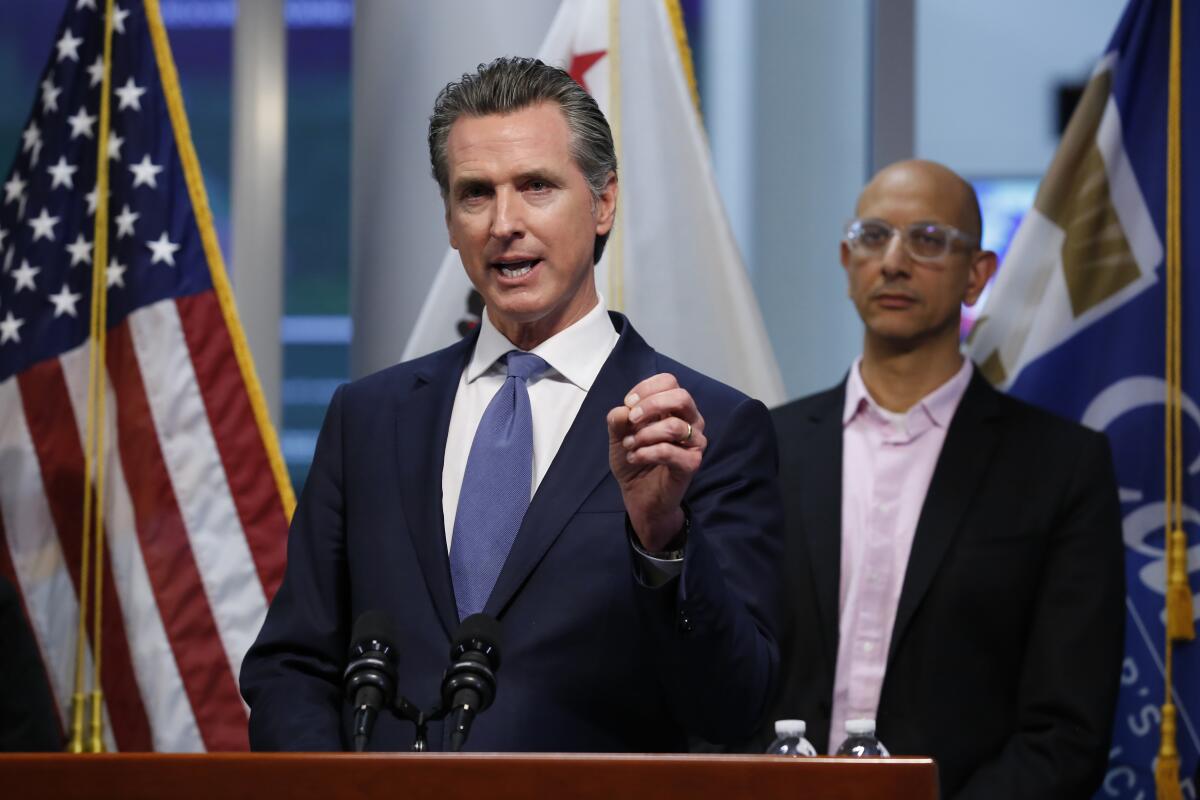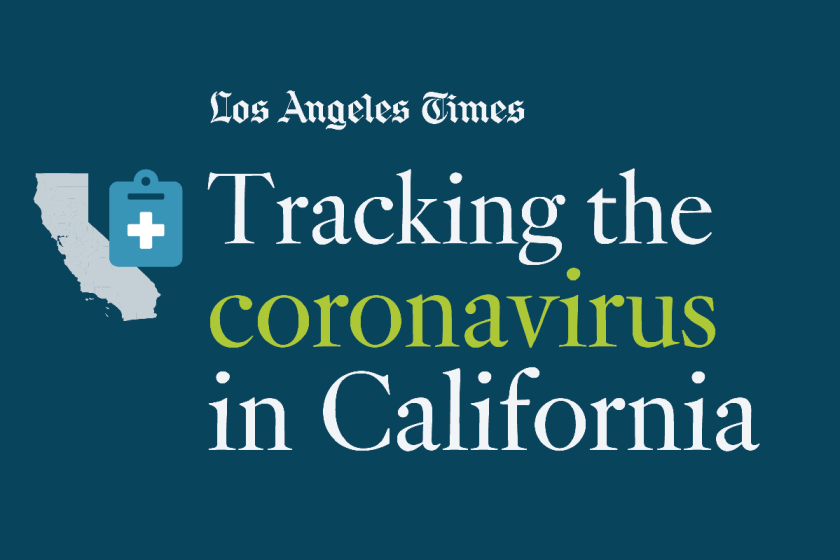1 million Californians file for unemployment; homeowners hurt by coronavirus will get a break

SACRAMENTO — Several major banks and other financial institutions have agreed to delay foreclosures and provide mortgage relief to California homeowners who are struggling to make their monthly payments due to the novel coronavirus outbreak, Gov. Gavin Newsom announced Wednesday.
The assistance comes as more than 1 million Californians have applied for unemployment benefits this month due to layoffs or reduced hours amid the pandemic, Newsom said.
Eligible homeowners would be able to defer mortgage payments for at least three months and perhaps longer if they suffer hardship due to the pandemic. Any late payments would not be reported to credit agencies.
Newsom said the mortgage relief package was negotiated with four of the nation’s largest banks — Wells Fargo, U.S. Bank, CitiBank and J.P. Morgan Chase — as well as 200 state-chartered banks and credit unions.
“We still have people that are struggling to get back to where they were before the Great Recession,” Newsom said of the financial struggles Californians have experienced, now exacerbated by the coronavirus outbreak. “People are older and still struggling. And so these are individuals that once again are disproportionately being impacted by this moment.”
Senate approves the stimulus package created in response to the coronavirus pandemic. Trump says he will sign it.
At a news conference to announce the homeowner assistance, Newsom noted that Bank of America agreed only to allow customers to defer mortgage payments for one month, but said he is hopeful the institution “will do the right thing” in the near future.
Bank of America disputed Newsom’s assertion that it was resistant to providing more generous mortgage relief to homeowners.
“Bank of America is deferring mortgage payments on a monthly basis until the crisis is over,” said spokesperson Bill Halldin.
Diana Dykstra, president and CEO of the California Credit Union League, the trade association for credit unions in the state, said “we are always first to reach out to our members and do whatever we can to help them when they have financial difficulties.”
The governor’s announcement on Wednesday came a week after Newsom ordered all California residents to stay at home to help stem the spread of the virus, with limited exceptions for essential workers — including doctors, nurses, grocery store employees and truckers. Residents are permitted to leave the house for necessities, such as trips to supermarkets and to see the doctor, and to go outside for recreation, but are urged to keep a safe distance from others.
Thousands of Californians have lost their jobs or have seen their working hours dramatically reduced, particularly in the hospitality and service industry.
The latest maps and charts on the spread of COVID-19 in California.
Newsom praised the bipartisan deal in Washington to increase unemployment benefits and help Americans struggling during the outbreak’s devastating blow to the economy, saying that assistance is desperately needed in California.
“We just passed the 1 million mark in terms of the number of [unemployment] claims just since March 13,” Newsom said. “One million Californians have now claimed the need to get unemployment insurance, so this cannot happen soon enough.”
Along with the mortgage assistance, Newsom is urging banks and other lenders to provide financial relief to small businesses and student loan recipients “in the days and weeks to follow,” according to a recent email sent to financial institutions by state Department of Business Oversight Commissioner Manuel P. Alvarez.
“As we continue the battle on the public health front, we must also brace ourselves for a financial crisis that is only beginning,” Alvarez said in the email. “Now is the time for all institutions, public and private, to do our part in staving off a tsunami of financial harm barreling toward California consumers.”
Millions of Californians were already struggling to make mortgage and rent payments in a state where housing prices and rent payments have skyrocketed in recent years, putting them at risk of losing their homes due to a sudden loss of income.
Similar mortgage relief measures were put in place for homeowners in response to the Great Recession, when housing markets crashed and millions of Americans lost their homes to foreclosure.
The federal government earlier this month announced that Americans with loans backed by the government-sponsored agencies Fannie Mae or Freddie Mac would be eligible to defer mortgage payments and be shielded from foreclosure if they could not afford to make payments due to the outbreak.
The financial relief that the governor announced for homeowners is significantly more than renters across the state are receiving.
Unlike some other states, California has not implemented a statewide ban on evictions and has offered no comprehensive deferral of rent payments — even though California has a lot more renters than elsewhere in the U.S.
The state’s 55% homeownership rate is one of the nation’s lowest, according to U.S. Census Data. The majority of people in L.A. County are renters, with just 46% of households own their home.
Last week, Newsom issued an executive order asking — but not mandating — cities and counties to place temporary bans on evictions for renters affected by coronavirus, something Los Angeles and other local governments were already doing.
But only a fraction have done so. More than 30 state lawmakers sent a letter to the governor on Wednesday asking him to do more. The letter said that only 50 of the state’s 539 cities and counties have put their own temporary eviction bans in place.
Has someone in your household tested positive for the coronavirus? Here’s guidance on how to care for them and how self-isolation can work in a shared home.
“With many renters suddenly out of work and the rent due the first week of April, it’s critical that the state act now to assure tenants that they will not be evicted,” the letter said.
The letter follows a similar plea to Newsom last week from more than 140 housing advocacy, civil liberties, student and labor groups asking him for greater relief from evictions.
At Wednesday’s news conference, the governor indicated that he was frustrated that few cities had passed eviction bans.
“We are very concerned about what’s happening — or not happening — at the local level,” Newsom said.
While Newsom said he still could implement a statewide moratorium, he noted that he was hesitating due to unspecified legal issues unique to the state. The governor’s office did not respond to a request for more details about those concerns.
Last week, John Sprankling, an expert in property law and a professor at the University of the Pacific’s McGeorge School of Law in Sacramento, told The Times that the state had significant power to enact an temporary eviction ban during an emergency.
“There would undoubtedly be litigation about this,” Sprankling said. “Some landlords are going to lose a significant amount of money. But it’s pretty easy to predict that courts are going to say they’re not entitled to compensation from the state.”
As of Wednesday morning, Newsom said 2,535 people in the state had tested positive for COVID-19, including 37 children under the age of 17. Newsom also said that the state has now tested more than 66,800 people but is still stymied by slow results.
Dr. Mark Ghaly, secretary of California’s Health and Human Services agency, said cases of the virus are doubling every three to four days in California, and a surge in hospitalizations is predicted to happen in one to two weeks under current conditions.
Times Staff Writers Anita Chabria and Ben Poston contributed to this report.
More to Read
Sign up for Essential California
The most important California stories and recommendations in your inbox every morning.
You may occasionally receive promotional content from the Los Angeles Times.















